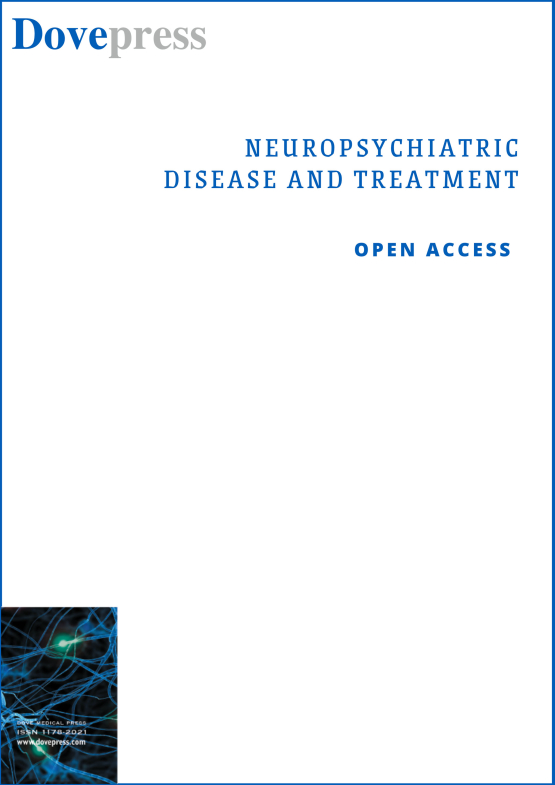Submit a Manuscript to the Journal
Neuropsychiatric Disease and Treatment
For an Article Collection on
Neuropsychiatric Aspects of Autoimmune Illness and Infectious Disease
Manuscript deadline


Article collection guest advisor(s)
Dr. Daniel A. Kinderlehrer,
Private practice, Denver, CO, USA
kinderlehrer@gmail.com
Dr. Robert C Bransfield,
Hackensack Meridian School of Medicine, Nutley, NJ, USA
bransfield@comcast.net
Neuropsychiatric Aspects of Autoimmune Illness and Infectious Disease
In the 17th century, Rene Descartes posited that the mind and body are fundamentally distinct, but the boundary between physical and mental health has been challenged by awareness that psychological factors influence physical health. It was in 1818 that the German physician Johann Christian introduced the term “psychosomatic”. Over the past century it has become increasingly apparent that physical disease can cause psychiatric symptoms, or “somatopsychic” illness. While this pattern has long been apparent in conditions such as thyroid disorders, brain tumors and vitamin deficiencies, there is now widespread research documenting the role of neuroinflammation as a cause of neuropsychiatric disorders. Autoimmune illnesses and infections are increasingly recognized as potential contributors to neuropsychiatric illness.
The immune system is tasked with defending the body against pathogens and aberrant cell growth that may lead to malignancies. When the immune response becomes misdirected, the resulting inflammation can attack healthy tissues, including those in the brain. Neuroinflammation can manifest as cognitive changes, depression, anxiety, psychosis, irritability or other neuropsychiatric symptoms. Understanding the capacity of autoimmune conditions and infections to cause a wide range of mental health issues is crucial for accurate diagnosis and treatment, especially when psychiatric symptoms emerge suddenly or atypically, or precede physical complaints.
The intersection of the immune system and brain function has emerged as a crucial frontier in medicine. Autoimmune diseases and infections are increasingly recognized not only for their systemic manifestations but also for their profound neuropsychiatric effects. Conditions such as lupus, multiple sclerosis, post-Covid syndrome, Lyme disease and even common viral illnesses can trigger a wide range of cognitive, emotional, and behavioral symptoms. Understanding these complex interactions is vital for early diagnosis, effective treatment, and improved quality of life for affected individuals. This Article Collection brings together cutting-edge research and expert perspectives on the mechanisms, clinical presentations, and therapeutic approaches to neuropsychiatric complications of autoimmune and infectious diseases. Through a multidisciplinary lens, we aim to highlight the biological underpinnings, diagnostic challenges, and evolving management strategies at this dynamic interface between immunology, neurology, and psychiatry.
Dr. Daniel A. Kinderlehrer M.D. is a nationally recognized physician with expertise in the fields of nutrition, allergy, environmental medicine, Lyme disease and the healing of mind-body-spirit as a unified whole. Dr. Kinderlehrer has taught extensively, including practitioner training courses at the Omega Institute, The National Institute of Behavioral Medicine, and the International Lyme and Associated Diseases Society. He is the author of several articles in medical journals, the Lyme Times, and Psychology Today. His integrated medical practice in Denver, Colorado focuses on the diagnosis and treatment of tick-borne disease. Dr. Kinderlehrer is the author of Recovery From Lyme Disease: The Integrative Medicine Guide to the Diagnosis and Treatment of Tick-Borne Illness, which was released in 2020.
Dr. Robert C. Bransfield, MD, DLFAPA has held a number of administrative positions with hospitals and organizations involved with health, mental health and community related activities and has received multiple awards from the American Psychiatric Association and the International Lyme and Associated Diseases Society. Dr. Bransfield’s clinical activities has focused upon treating patients who are considered to be treatment resistant. Many of these patients were found to have infectious disease contributors to their psychiatric symptoms. As a result, his research has often focused upon the association between infectious disease and mental illness. Dr. Bransfield has authored and co-authored a number of publications in peer-reviewed and other literature and has been active in political advocacy.
All manuscripts submitted to this Article Collection will undergo desk assessment and peer review as part of our standard editorial process. Guest Advisors for this collection will not be involved in peer-reviewing manuscripts unless they are existing members of the Editorial Board. Please review the journal Aims and Scope and Author Submission Instructions prior to submitting a manuscript.
Please submit your manuscript on our website, quoting the promo code 80BEE to indicate that your submission is for consideration in this Article Collection.
Please contact the Sam Zhang at sam.zhang@taylorandfrancis.com with any queries and promo codes regarding this Article Collection.
Benefits of publishing open access within Taylor & Francis
Global marketing and publicity, ensuring your research reaches the people you want it to.
Article Collections bring together the latest research on hot topics from influential researchers across the globe.
Rigorous peer review for every open access article.
Rapid online publication allowing you to share your work quickly.
Submission Instructions
All manuscripts submitted to this Article Collection will undergo desk assessment and peer-review as part of our standard editorial process. Guest Advisors for this collection will not be involved in peer-reviewing manuscripts unless they are an existing member of the Editorial Board. Please review the journal Aims and Scope and author submission instructions prior to submitting a manuscript.
